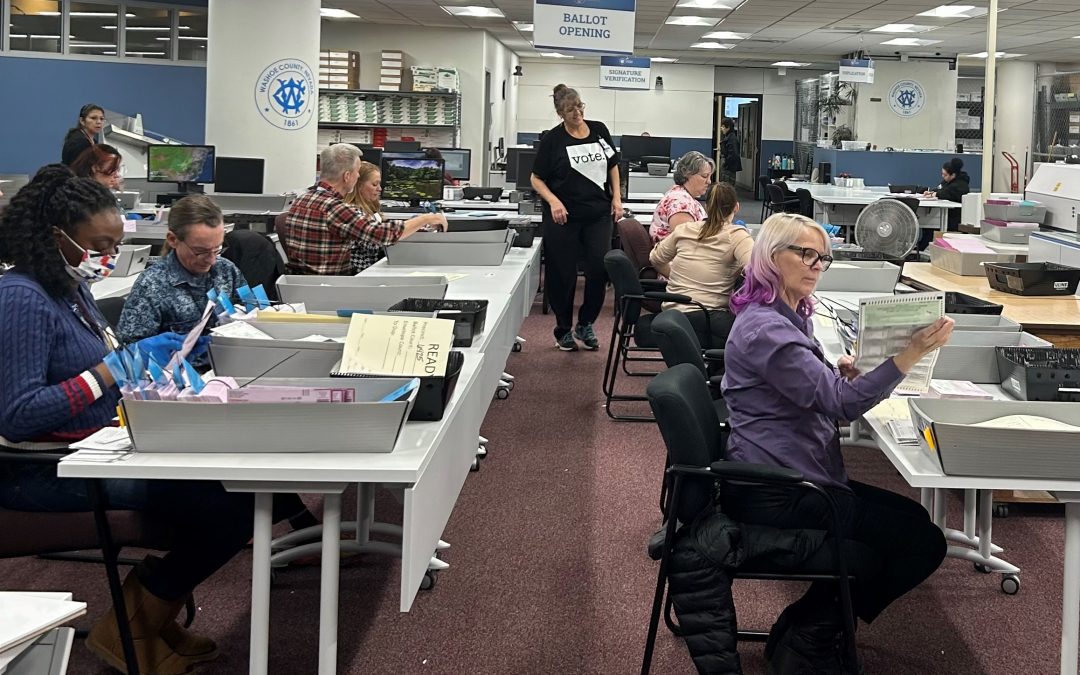RENO — Nevada voters were closely divided on a ballot measure that would shape future primary elections, and the outcome remained undetermined Thursday as officials continued to count mail-in ballots.
The measure, known as Question 3, would allow primary voters to cast votes for any party. It also would let voters rank candidates from one to five rather than just choose one.
In a state where about 40% of voters are independent, Question 3 would provide many Nevada residents access to primary elections, which they now have to sit out. But the ballot measure was confusing for many voters.
As Election Day neared, many voters who called into a radio show said they did not understand ranked choice voting.
“I do believe that you shouldn’t have to be affiliated with any party to be able to vote in the primary. But I am concerned about this whole ranking process,” Christine Emeterio, a mother of two from Reno, said Monday during KBUL’s morning show. “I think it makes it kind of convoluted and it can be confusing for some. I’m still going back and forth on how to vote tomorrow.”
Although ballots were still being processed, of those that were counted as of Thursday morning, 51.8% were for and 48.2% were against the measure, according to the New York Times.
The final results might not be clear for another week, Jamie Rodriguez, Washoe County government affairs manager, told the press on election night.
Even though the ballot measure was getting a lot of support, there appeared to be a consensus that ranked choice voting was confusing and did not belong on the ballot with open primaries.
During a local radio station’s morning program, talk show hosts, Bob Richards and Cat Bellah, asked local residents their views on Question 3. Listeners who called in were split about whether they agreed that primaries should be open. But everyone disagreed with the idea of voters ranking candidates in primaries.
Some voters said that Question 3 would benefit the Silver State because open primaries mean that registered voters would be allowed to vote for any candidate, regardless of party membership.
“I want a voice in these elections, and it should not matter about political party,” said Megan Stoddard, an independent and teacher at Spanish Springs High School.
Stoddard said that people who aren’t registered as Republicans or Democrats have no role in the primaries.
Many independent voters support Question 3. A growing percentage of Nevada’s electorate are independents, according to data from the secretary of state’s office. More than 38% of the state’s voters were registered as nonpartisan or for a minor party as of earlier this month.
Cindy Wilson, however, argued that people should not be so quick to support open primaries and ranked choice voting.
“For me, it is a no on Question 3, the reason being that each party selects who they want to run in the general election and there are too many ways to manipulate that if we allow everyone to vote,” Wilson said.
Wilson is suspicious, for instance, that Democrats might vote for weak Republican candidates in primaries hoping for a vulnerable opponent in the general election.
Proponents of closed primaries said that parties should have the power to allow only their members to participate in the nomination of candidates.
Because it would modify the state constitution, voters have to vote twice on Question 3. So even if it passes, it would have to come up again in the 2024 election cycle.
Voters would not have open primaries and ranked choice voting before the 2026 election.
“I suspect it’ll pass but it’s got to pass twice,” said Dan Mason, program director, talk show host at KOH in Reno, Nevada. “So, we’ll have another two years to go around and around about it.”

